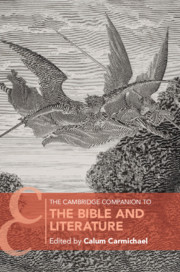Book contents
- The Cambridge Companion to the Bible and Literature
- Cambridge Companions to Religion
- The Cambridge Companion to the Bible and Literature
- Copyright page
- Contents
- Contributors
- Abbreviations
- Introduction
- 1 Literature in the Ancient Near East and the Bible
- 2 The Primary Narrative (Genesis through 2 Kings)
- 3 Reading Biblical Literature from a Legal and Political Perspective
- 4 Biblical Law and Literature
- 5 Kings, Prophets, and Judges
- 6 Prophetic Literature
- 7 Wisdom Literature
- 8 The Gospels
- 9 Paul’s Letters
- 10 Apocalyptic Literature
- 11 Shakespeare’s King Lear and the Bible
- 12 The Bible and John Milton’s Paradise Lost
- 13 The Bible, Shelley, and English Romanticism
- 14 Herman Melville and the Bible
- 15 The Song of Songs and Two Biblical Retellings
- Index
- Other Titles in the Series
- References
12 - The Bible and John Milton’s Paradise Lost
Published online by Cambridge University Press: 13 March 2020
- The Cambridge Companion to the Bible and Literature
- Cambridge Companions to Religion
- The Cambridge Companion to the Bible and Literature
- Copyright page
- Contents
- Contributors
- Abbreviations
- Introduction
- 1 Literature in the Ancient Near East and the Bible
- 2 The Primary Narrative (Genesis through 2 Kings)
- 3 Reading Biblical Literature from a Legal and Political Perspective
- 4 Biblical Law and Literature
- 5 Kings, Prophets, and Judges
- 6 Prophetic Literature
- 7 Wisdom Literature
- 8 The Gospels
- 9 Paul’s Letters
- 10 Apocalyptic Literature
- 11 Shakespeare’s King Lear and the Bible
- 12 The Bible and John Milton’s Paradise Lost
- 13 The Bible, Shelley, and English Romanticism
- 14 Herman Melville and the Bible
- 15 The Song of Songs and Two Biblical Retellings
- Index
- Other Titles in the Series
- References
Summary
Milton’s command of the Bible in the original languages (Hebrew, Greek, etc.) as well as in English created the resonance of Paradise Lost, notably in such passages as the catalogue of the devils in Book One and the summary of the entire Bible in Books Eleven and Twelve. Milton focused, however, on the myth of Eve and Adam to seize upon the Bible as a whole and to emphasize that universal humanity is his subject. But Milton is free and original in how he uses the Bible, scaling up small things to giant proportions, as with Sin and Death, and downplaying or ignoring traditional Christian themes, such as the personal nature of our relation to God. Milton reads the Bible as a Christian humanist: for political ends in this world. The “paradise within” prophesied by the angel Michael at the end of Paradise Lost is the political ideal for “mankind” as a whole, for humanity, at the end of Paradise Regained.
- Type
- Chapter
- Information
- The Cambridge Companion to the Bible and Literature , pp. 200 - 217Publisher: Cambridge University PressPrint publication year: 2020

